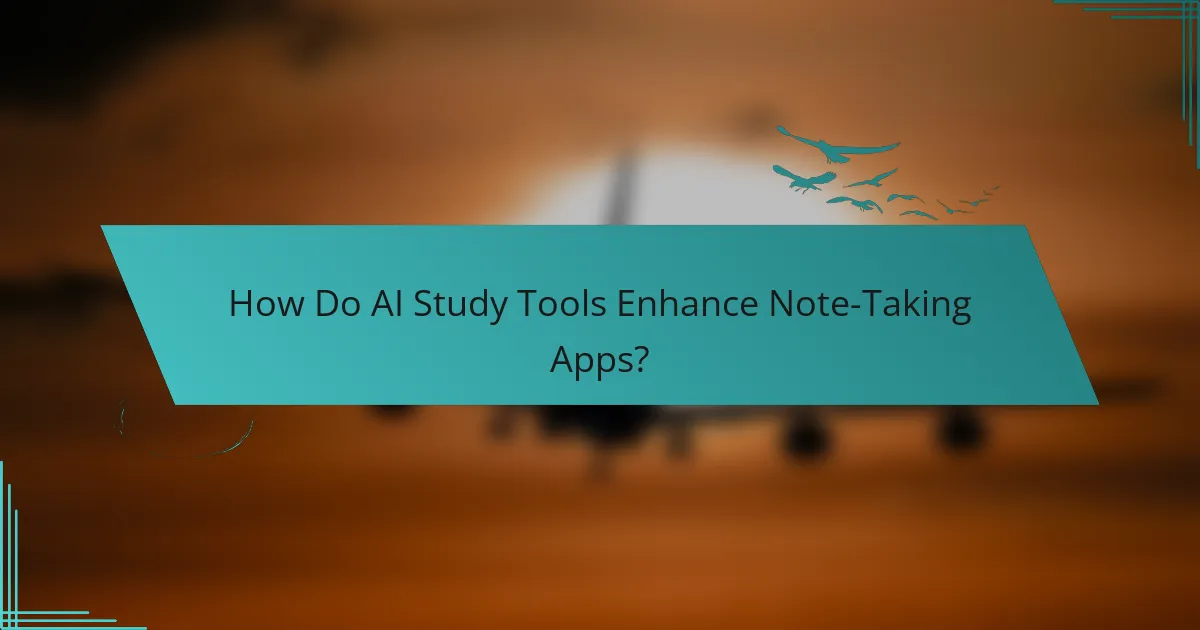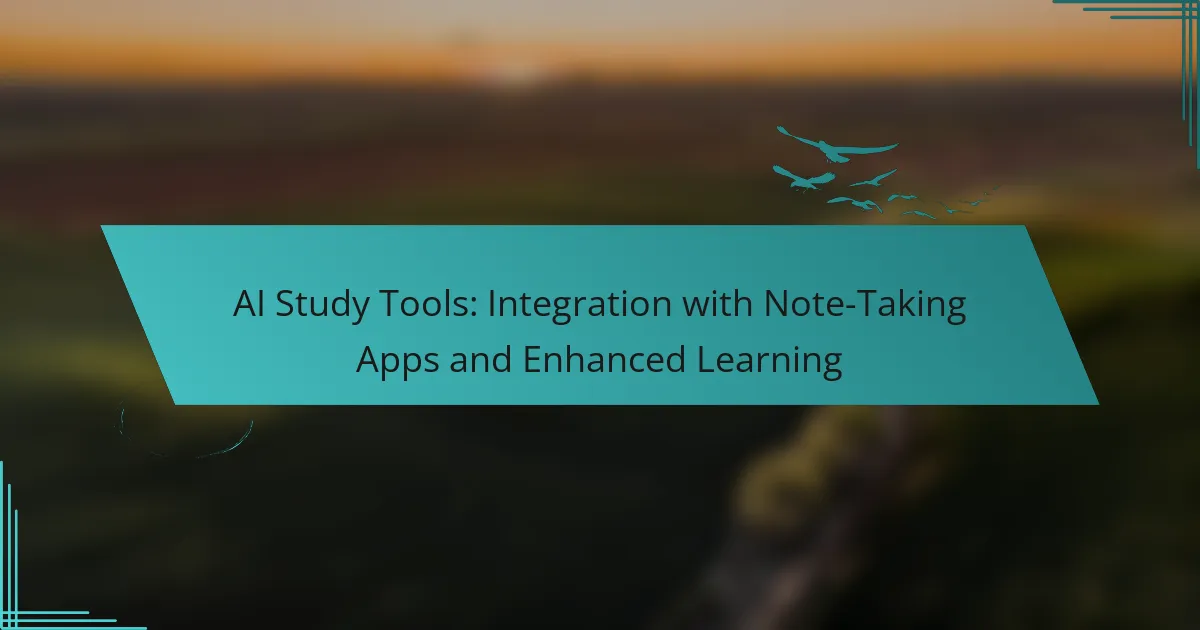AI study tools are revolutionizing the way we approach note-taking by automating tasks, intelligently organizing information, and personalizing learning experiences. By integrating these tools with existing note-taking apps, students can enjoy more efficient study sessions and improved retention of material. Selecting the right AI study tool involves evaluating compatibility, user experience, and pricing to enhance learning seamlessly.

How Do AI Study Tools Enhance Note-Taking Apps?
AI study tools significantly improve note-taking apps by automating processes, organizing information intelligently, and providing personalized learning experiences. These enhancements lead to more efficient study sessions and better retention of material.
Automated summarization features
Automated summarization features allow AI tools to condense lengthy notes into concise summaries, making it easier for students to review key concepts quickly. This functionality can save time and enhance comprehension by highlighting the most important information.
For instance, an AI tool might analyze a lecture transcript and generate a summary that captures the main points in just a few sentences. This enables learners to focus on essential content without sifting through extensive notes.
Intelligent organization of notes
AI study tools can intelligently organize notes by categorizing them based on topics, themes, or relevance. This organization helps students locate information swiftly and reduces the clutter often found in traditional note-taking methods.
For example, an AI-powered app might automatically tag notes with keywords and group them into folders, allowing users to access related materials with a single click. This feature is particularly beneficial during exam preparation when quick retrieval of information is crucial.
Integration with learning management systems
Integration with learning management systems (LMS) allows AI study tools to sync notes and resources directly with course materials. This connection ensures that students have access to the latest information and assignments, streamlining their study process.
Many popular note-taking apps now offer plugins or APIs that facilitate this integration, enabling seamless updates and notifications about course changes. This feature helps students stay organized and informed about their academic responsibilities.
Personalized study recommendations
Personalized study recommendations leverage AI algorithms to suggest tailored study materials and techniques based on individual learning patterns. This customization can significantly enhance a student’s ability to grasp complex subjects and improve overall academic performance.
For instance, an AI tool might analyze a student’s past performance and suggest specific topics to review or practice quizzes that target weak areas. This focused approach can lead to more effective study sessions and better retention of information.

What Are the Best AI Study Tools for Note-Taking?
The best AI study tools for note-taking enhance the organization and retrieval of information, making study sessions more efficient. These tools leverage artificial intelligence to automate tasks, suggest content, and improve overall learning experiences.
Notion with AI capabilities
Notion integrates AI features that help users streamline their note-taking process. It can generate summaries, suggest related content, and even assist in organizing notes based on context. This makes it particularly useful for students who need to manage large volumes of information.
To maximize Notion’s AI capabilities, users should familiarize themselves with its templates and databases. Utilizing these features can help create a more structured approach to studying, allowing for easy navigation and retrieval of notes.
Evernote with AI integration
Evernote offers AI integration that enhances its note-taking functionalities by providing smart search options and content recommendations. Users can quickly find relevant notes and even receive suggestions for organizing their study materials more effectively.
For optimal use, students should take advantage of Evernote’s tagging system and notebooks to categorize their notes. This organization method, combined with AI suggestions, can significantly reduce the time spent searching for information.
Microsoft OneNote with AI features
Microsoft OneNote incorporates AI features that assist in note-taking by allowing users to convert handwritten notes into text and providing intelligent search capabilities. This is particularly beneficial for students who prefer taking notes by hand but want the convenience of digital text.
To get the most out of OneNote’s AI features, users should regularly sync their notes and explore the integration with other Microsoft Office tools. This can create a seamless workflow for studying and collaborating with peers.

How to Choose the Right AI Study Tool?
Choosing the right AI study tool involves assessing its compatibility with your existing note-taking apps, evaluating the user interface and experience, and considering pricing and subscription models. These factors will help ensure that the tool enhances your learning without causing unnecessary friction.
Assessing compatibility with existing apps
Start by identifying the note-taking apps you currently use and check if the AI study tool integrates seamlessly with them. Compatibility can significantly enhance your workflow, allowing you to leverage existing notes and resources without needing to switch platforms.
Look for tools that offer direct integrations or support for common file formats. For example, if you use apps like Evernote or OneNote, ensure the AI tool can import and export notes easily, which saves time and effort.
Evaluating user interface and experience
A user-friendly interface is crucial for effective study sessions. When evaluating an AI study tool, consider how intuitive the design is and whether it allows for easy navigation. A cluttered or confusing interface can detract from your learning experience.
Try out the tool through free trials or demos to assess its usability. Pay attention to features like search functionality, customization options, and accessibility, as these can greatly influence your overall satisfaction and productivity.
Considering pricing and subscription models
Pricing can vary widely among AI study tools, from free versions with limited features to premium subscriptions that offer extensive capabilities. Evaluate your budget and determine what features are essential for your needs before committing to a subscription.
Some tools offer tiered pricing based on usage or additional features, so consider whether you might need to upgrade in the future. Look for options that provide good value for money, such as educational discounts or bundled services, which can make a significant difference in cost-effectiveness.

What Are the Benefits of Integrating AI with Note-Taking?
Integrating AI with note-taking apps enhances the learning experience by improving information retention, facilitating collaboration, and automating time-consuming tasks. These benefits allow users to focus on understanding and applying knowledge rather than just recording it.
Improved retention of information
AI-powered note-taking tools can analyze user input and highlight key concepts, making it easier to remember important information. Techniques like spaced repetition and personalized quizzes can be integrated to reinforce learning over time.
For example, an AI tool might suggest reviewing notes on a specific topic just before a related exam, increasing the likelihood of recall. This targeted approach can significantly boost retention rates compared to traditional methods.
Enhanced collaboration features
Integrating AI with note-taking apps allows for real-time collaboration between users, making group projects more efficient. AI can automatically organize contributions, track changes, and suggest edits, ensuring that everyone stays on the same page.
For instance, a team working on a presentation can use AI to compile notes from multiple sources, categorize them, and highlight areas needing further discussion. This streamlines communication and reduces the chances of miscommunication.
Time-saving automation processes
AI can automate repetitive tasks such as formatting notes, summarizing lengthy texts, or extracting key points from lectures. This saves users significant time, allowing them to concentrate on more critical aspects of their studies.
For example, an AI tool might automatically generate a summary of a lecture, enabling students to review essential points quickly without sifting through hours of recordings. This efficiency can lead to better time management and improved academic performance.

What Challenges Are Associated with AI Study Tools?
AI study tools present several challenges that users should consider, including data privacy, reliance on technology, and the risk of misinformation. Understanding these challenges can help users make informed decisions about integrating AI into their learning processes.
Data privacy concerns
Data privacy is a significant issue when using AI study tools, as these applications often require access to personal information and learning habits. Users should be cautious about the data they share and review the privacy policies of the tools they choose.
To mitigate risks, select tools that comply with data protection regulations like GDPR or CCPA, which ensure user data is handled responsibly. Regularly updating privacy settings and being aware of what data is collected can further enhance security.
Dependence on technology
Relying heavily on AI study tools can lead to a dependence on technology, potentially diminishing critical thinking and problem-solving skills. Users may find themselves less engaged in the learning process if they rely solely on AI for answers.
To balance technology use, incorporate traditional study methods alongside AI tools. Setting specific times for technology use and practicing self-directed learning can help maintain a healthy relationship with these resources.
Potential for misinformation
AI study tools can sometimes provide inaccurate or misleading information, which can hinder learning. Users must critically evaluate the content generated by these tools and cross-reference it with reliable sources.
To avoid misinformation, consider using AI tools that include citations or references to reputable sources. Engaging with peer-reviewed materials and consulting experts in the field can further ensure the accuracy of the information being studied.
